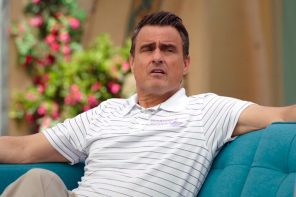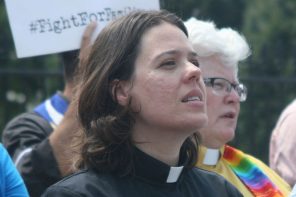On July 27, Jim D. Adkisson walked into the Unitarian Church in Knoxville Tennessee, where children were performing the play “Annie,” and opened fire. I can’t imagine what it might have been like to be a child in the church that day. A summer of learning and theater descended in a single second into violence and death. When the shooting began, some were so incredulous as to think it was part of the play. Mr. Adkisson had left a letter in his car stating, among other things, his hatred of the liberal movement.
Forty years ago, in the summer of 1968, I was also a Unitarian Universalist child. I was raised with the “Church across the Street” curriculum, where several Sundays a year, we visited the members of other religions in the area. We wouldn’t have put it this way then, but we were taking part in something like our own miniature version of the Pluralism Project. Every Christmas we lit the Chanukah candles, sang Rudolph the Red-Nosed Reindeer, and had a seminar on the Winter Solstice. It was not, as some scholars would say, “confined to a single orthodoxy.” But it gave me the commitment to openness and inquiry that makes up the core of my scholarly identity today.
Unitarian Universalism also taught me about human rights, civil rights, and gay rights. I was seven in the summer of 1968, and most of that summer I was blowing bubbles, working on my Etch-A-Sketch, and picking dandelions on my mother’s lawn for a penny a dandelion. But that summer in Sunday school class we also learned about the ways in which people were deprived of rights, and we collected money to help them. We learned about the assassinations of Martin Luther King Jr. and Bobby Kennedy. And we learned about what kinds of things people were doing to change the world. During that summer of 1968 I think I even performed in a play like the one the children of Knoxville did.
I didn’t know then that I was a part of something larger called liberalism. I didn’t know then that the word “liberal” would be pronounced, a decade and a half later, with a certain scorn and derision that has stuck to it ever since. I thought that everyone learned about human rights and civil rights and gay rights in Sunday school. And I thought everyone learned about other religions. I thought learning about other religions was religion.
Sunday’s horrifying episode reminded me that as a liberal I was, and am, part of the culture wars—and that those culture wars are sometimes far more than just “culture.” They are, by now, a deeply rooted part of the split in American life, whereby those who legitimately seek inclusion and change are pitted against those who legitimately wish to conserve the best of our culture. The divide is so deep that those who are already unstable and prone to violence can draw upon those culture wars to justify violence—the same way that anti-Semitism or anti-Muslim sentiments have surfaced in violent acts perpetrated by unstable (and some alarmingly stable) people in recent memory, such as the shooting at the Jewish Community Center in Seattle and attacks on the mosques in the wake of 9/11.
Theories of religion and violence are abundant in religious studies—even more so since 9/11. Some scholars focus on the ways religions find justification in their own scriptures for acts of violence. Others focus on the ways economic and political oppression create a cult of martyrs; the only meaningful life is one which ends in a violent death, resisting the oppressor. Some focus on the “ethnic” elements of religious conflicts, or the “religious” elements of ethnic conflicts. Still others argue that some religions are more inherently violent than others.
All of them focus, in some way or another, on a clash of ideologies, with “religion” as part of the ideological mix. But the crucial question that the Knoxville episode reminds us is: when do seemingly manageable religious differences within a functioning democracy become something more treacherous? When do “culture wars” become just “wars,” without the tempering effect of the word “culture” before them?
I already imagine that some liberal churches, like many synagogues and some mosques, will be justifiably thinking about a better security detail. They will have been reminded that standing for liberal causes can be dangerous, in ways that seemed almost impossible for me to imagine as a seven-year-old in 1968. They will have been reminded of that mortal slippage from “culture wars” to “wars.”
Several people in the church in Knoxville stated publicly that they wished that Mr. Adkisson had sought help earlier, before he had become so violently deranged that he was willing to kill. When I read those statements of church members, I was reminded of another lesson I learned as a Unitarian child: that there is another way to respond to religiously motivated violence besides inaugurating a cycle of vengeance.
I am no longer a Unitarian Universalist though my childhood in the church inspired me to hold fast to certain immutable ideas: that we can teach about other religions with the hope that the seemingly irrevocable split in the American psyche can in some small way be healed, and that we should refuse to give up on the notion that American culture is at its most vibrant in those rare moments when the best of the liberal and the best of the conservative traditions converge.
I had forgotten just how perilous those ideas can be.




